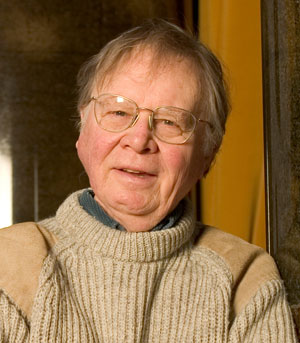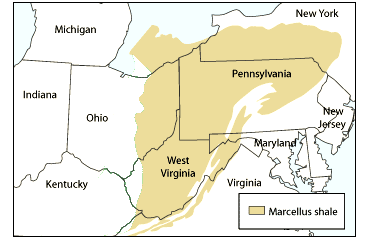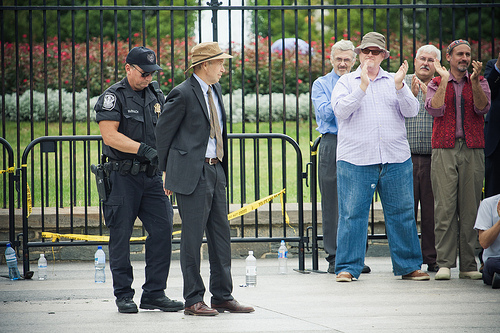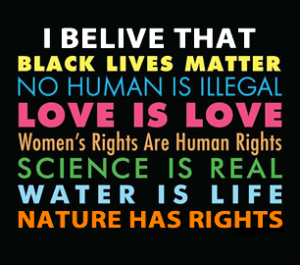The Resignation of Scientific Capitalism
Last month I had the chance to write a response piece for the IRCPL, where a friend happens to work, about a public talk given by Wallack Broecker at Columbia. The published piece can be read on the IRCPL website here.
What follows here is an extended version I originally wrote, and decided to publish here, since it has additional multimedia better suited to a post here.
[Updated 12/10]
As a lifelong advocate of environmental education and a student of catastrophic and apocalyptic discourses in popular culture today, I was excited to hear that Columbia University’s Institute for Religion, Culture and Public Life (IRCPL) was bringing Wallace Broecker to talk about climate change and apocalypse as part of their yearlong series Apocalypse Now, which is billed as a “series of conversations with writers that explores our current fascination with apocalyptic visions.” The talk also included NY Times writer John Broder, who covers environmental issues in Washington.
 It’s also worth pointing out that this was the third event in the Apocalypse Now series (one other event was cancelled due to Hurricane Sandy a few weeks ago), and that having been to all of these earlier talks, some of my comments here are reflecting on this series as a whole, while others are looking at Broecker’s talk in particular, as I think the two are inter-related.
It’s also worth pointing out that this was the third event in the Apocalypse Now series (one other event was cancelled due to Hurricane Sandy a few weeks ago), and that having been to all of these earlier talks, some of my comments here are reflecting on this series as a whole, while others are looking at Broecker’s talk in particular, as I think the two are inter-related.
For starters, I have to admit my level of disappointment, while certainly not apocalyptic, was pretty high after listening to someone considered to be a leading authority in the field of earth science and climate change talk about the state of ecological affairs today. I’d sum up Broecker’s comments like this:
‘Sorry kids, you’re pretty much screwed and I’ll be dead soon, so I don’t really have to deal with the seriously awful ecological future that my generation is leaving you. As a climate scientist I can say there are no easy solutions to the climate problem, and things are only going to get worse in the future due to governmental inaction and continued industry influence. Regardless of all this, I still have faith in industrial technology and free-market capitalism to solve things eventually, but by the time we act a lot of the planet will look a lot different than it does today. So good luck with that, hope it all turns out for the best.’
It was clear from the talk that he has little faith in government policy to seriously address climate change, and for good reason. President Obama’s recent comments on climate change, “if the message is somehow we’re going to ignore jobs and growth simply to address climate change, I don’t think anybody is going to go for that,” leave little room for green excitement, as it shows there is still a fundamental ignorance about the real impact of climate change related issues on the part of American political leaders. A point, I might add, that is in stark contrast to the CIA funded National Research Council’s report Climate and Social Stress: Implications for Security Analysis released last week, and which, ironically, was slated for release just as Hurricane Sandy shut down the Eastern seaboard and DC. That report makes the severity of this issue quite clear in Conclusion 5.1:
It is prudent to expect that over the course of a decade some climate events—including single events, conjunctions of events occurring simultaneously or in sequence in particular locations, and events affecting globally integrated systems that provide for human well-being—will produce consequences that exceed the capacity of the affected societies or global systems to manage and that have global security implications serious enough to compel international response. It is also prudent to expect that such consequences will become more common further in the future.
When asked about possible links between Hurricane Sandy and climate change Broecker demurred, citing the many scientific difficulties in correlating individual climate events to climate change due to background climate variability, but noted that many of the future climate change impacts “will come as surprises.” When pushed on the link between the two he was only willing to say that “I think what Sandy tells us is a lot of surprises are coming…and we’re not going to like it.” Given his scientific background and understanding of the dangers posed by out of control climate change, I expected Broecker would have a more critical position on energy policy and climate change. Not so. He ruled out any serious shift in US energy production, and made rather weak comments about impacts from our energy policy choices on the environment.
 For example, he accepted that the US will increase oil, gas and coal production in the near-term and argued we should be encouraging more natural gas over coal or oil for energy generation with little acknowledgment that an explosion of fracking (hydraulic fracturing for gas/oil extraction) in the Marcellus shale region of NY and PA would have catastrophic impacts to water and ecosystems in the region. This is an issue many New Yorkers are particularly anxious about given that all of our unfiltered drinking water for NYC comes from this upstate region, and once the groundwater is contaminated it’s game over. What he did mention is that more fracking will drive down the price of oil, thus delaying the transition towards more expensive oil prices on the market.
For example, he accepted that the US will increase oil, gas and coal production in the near-term and argued we should be encouraging more natural gas over coal or oil for energy generation with little acknowledgment that an explosion of fracking (hydraulic fracturing for gas/oil extraction) in the Marcellus shale region of NY and PA would have catastrophic impacts to water and ecosystems in the region. This is an issue many New Yorkers are particularly anxious about given that all of our unfiltered drinking water for NYC comes from this upstate region, and once the groundwater is contaminated it’s game over. What he did mention is that more fracking will drive down the price of oil, thus delaying the transition towards more expensive oil prices on the market.
Much of his talk was a mix of pessimism about the ability or political will to change, mixed with enthusiastic support for advanced industrial carbon capture and sequestration research and development, some of which is taking place at Columbia’s Lenfest Center for Sustainable Energy under the directorship of Dr. Klaus Lackner, a friend and colleague of Broecker. For those unfamiliar with what carbon capture and sequestration is, check out this animation from Columbia’s Earth Institute explaining some of the research they are doing right now:
For example, Broecker said “we have a massive, massive task ahead of us…people want to stick their heads in the sand” when discussing the challenge of addressing climate change and shifting to an energy mix with 15% or less fossil fuels. He suggested many of the quick fix solutions were merely band-aid fixes, and would not address the deeper structural problems of increasing CO2 in the atmosphere. “I don’t think ten little things will do the trick,” he said in response to a question from John Broder about efforts like raising fuel efficiency standards or increasing production of natural gas vehicles. As Broecker noted, based on models from the IPCC and others, we would need to get to an 85/15 split in alternative to fossil fuel energy to bring our CO2 down to Kyoto or later baselines (with 350 ppm being the big one) by 2050, and we’re not moving at all towards alternative energy in the US or globally, and populations are growing and energy demands are going up. All of this signals a real problem for societies around the world.
 It is this reality, at least in part, that seems to lead Broecker to favor the idea of carbon capture and storage so strongly. Because the CCS approach to dealing with climate change operates within the dominant logic of high-tech, industrial capitalism and market-driven environmental solutions, it is harder for industry to resist. It was clear from his comments that he has no faith in the environmental community being able to win out over the fossil fuel industry, and he was especially critical of anti-coal activism by scientists like NASA’s James Hansen. “It’s a bit like Don Quixote,” said Broecker of Hansen. “He’s never going to defeat the coal industry.”
It is this reality, at least in part, that seems to lead Broecker to favor the idea of carbon capture and storage so strongly. Because the CCS approach to dealing with climate change operates within the dominant logic of high-tech, industrial capitalism and market-driven environmental solutions, it is harder for industry to resist. It was clear from his comments that he has no faith in the environmental community being able to win out over the fossil fuel industry, and he was especially critical of anti-coal activism by scientists like NASA’s James Hansen. “It’s a bit like Don Quixote,” said Broecker of Hansen. “He’s never going to defeat the coal industry.”
Here I think Broecker is dead wrong, and it is precisely this resignation to scientific capitalism and high-tech solutions as the only viable option left that helped account for the sour taste that Broecker’s talk left in my mouth. Yet his comments about Hansen were also quite revealing, as it explains both why he seemed unwilling to engage in a serious discussion about environmental activism and why his overall talk was so pessimistic. It’s clear to me that Broecker has no faith in the ability of grassroots movements to achieve real environmental change, especially on an issue like climate change, and perhaps because of this he sees the market and technology option as the only game left in town. “I’m a very optimistic person in general, it’s just who I am. But I’m not optimistic we will do anything [about climate change]. It’s discouraging and the clock is ticking.”
Yet it is precisely this scientific resignation which I see as part of the problem. Broecker seemed to suggest scientists should be wary of engaging in environmental battles because they will always lose. Why? “As scientists we have to be honest,” argued Broecker. But industry and other climate change deniers are free to lie and doctor the science, and there is no way to win with the deck stacked like this. While Broecker may be right about that last point, that’s hardly a valid excuse for why scientists shouldn’t be more political engaged.
By way of conclusion, what did Broecker have to say about the apocalypse, which after all was supposed to be a key theme in this series? The answer is not much at all. “I don’t like that term,” Broecker said.
Until next time…“We are all in the gutter, but some of us are looking at the stars.”
###


